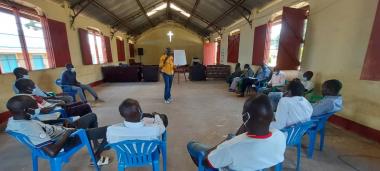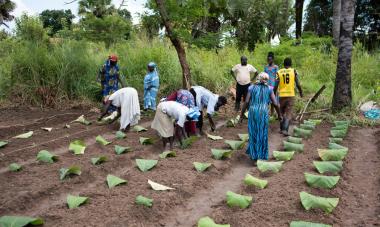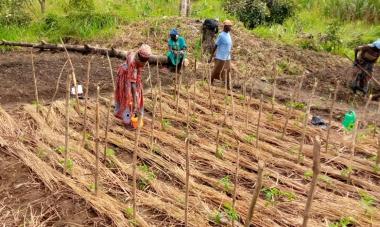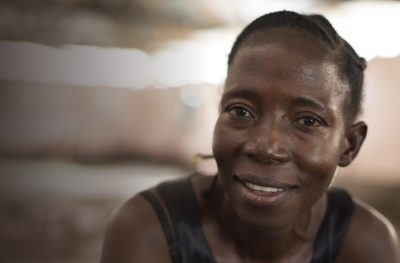In conflict-ridden South Sudan, change begins at home.
In the midst of a nation in violent conflict, it is rare to take the time to address domestic needs, the relationship dynamics of marriage, or the impact a strife-filled environment can have on children. But programs offered by Women for Women International (WfWI) are providing a platform to discuss exactly those kinds of topics, not only among women, (where discussions like that always begin), but for – and with – men.
The result has been an underground current of domestic dialogue between partners that has the potential to transform the entire culture – one family at a time.
Due to more than 30 years of hostile conflict, droughts, floods, starvation, and forced displacement, violence has become a way of life in South Sudan, imprisoning men and boys in a never-ending cycle of post-traumatic stress and leaving women and girls forgotten victims of abuse.
Some of the statistics are staggering: A 2016 cross-sectional survey among adult residents of Juba, the capital of South Sudan, observed that over 90% of respondents had experienced one or more traumatic events; 51.5% had directly experienced a combat situation; and 49.6% had witnessed the murder of family or friends.
That same study determined that 14 percent of the population warrant being labeled harmful or hazardous drinkers. In a country rampant with violence against women (VAW), alcohol and drug abuse only adds fuel to the fire.
Compounding the problem is that alcohol is deeply embedded in the culture, historically consumed in cultural and religious ceremonies. As well, many women, especially in female-headed households, engage in the production and sale of locally produced alcohol. Moreover, few, if any, treatment resources exist for substance abusers.
Despite the challenges, WfWI in South Sudan has been tackling the problem of making life safer for women from two different directions.
First, by learning how to earn an income, save money, and becoming educated about their rights, women in our Stronger Women, Stronger Nations program start to develop self-respect and self-sufficiency. Second, by addressing mental health challenges and developing communication skills, men begin to view themselves as responsible household partners.
“Men’s engagement is key,”
says Marianne Kajokaya, WFWI’s country director in South Sudan. “Home management is the responsibility of both men and women.”
WfWI’s Men’s Engagement Program (MEP) has been designed specifically for men. Besides sessions in land ownership, trade skills and hygiene, men also study family planning, stress and trauma management, psychological wellness, and conflict resolution through healthy communication.
Specific sessions focus on VAW, informing men about the dangers and repercussions and guiding them through prevention strategies. Included are discussions on the deleterious custom of child brides.
Learning about the power issues underlying violence is an eye-opener for many men in the region, particularly for those who are hearing about it for the first time. But a ripple effect seems to be occurring.
“MEP Trainees are now our male champions,” says Miriah John, WfWI’s country advocacy coordinator. “The men we train join in VAW awareness-raising and train other men in the community.” To that end, they appear on radio talk shows, lead community dialogues, and participate in road rallies alongside other WfWI program participants such as Change Agents and the core program beneficiaries.
The secret of the MEP’s success is not only serviceable information; it’s also about men talking to men – civilly. Psychological and moral guidance from one’s peers can be powerful. At a group training, MEP trainer Hakim John guided participants on positive stress management by saying, “Anger is human, but it has to be controlled. When you are stressed, manage it in a positive way. Do not fight or transfer anger to family and community members. Violence is bad, it breaks relationships."
Or, as MEP trainer Guva Cons advises the males in his class:
"Take good care of your home and your wife, that’s our responsibility as men."
In South Sudan, those are revolutionary perspectives.
MEP trainers also organize monthly couple-connect sessions where spouses are brought together to discuss strategies for VAW prevention, including domestic violence. The monthly sessions draw participants from various locations. By the end of 2022 almost a thousand men will have graduated from the program this year.
The success of the MEP is now being evidenced on a larger scale. According to Miriah, a reduced rate of VAW following MEP graduation in Yei County has been reported. Local chiefs testify of fewer reported incidents and even women say that their spouses, especially those enrolled in MEP, are showing more respect at home. Wives report being given more opportunities for shared household decision-making.
Interestingly, there has also been a drastic decline in alcohol and drug abuse among MEP trainees. Some women say their husbands are no longer labeled as “drunkards” or “idlers” in the community. Many MEP trainees have begun contributing to the household income, even saving the transport refund they receive to pay for their children’s school fees.
“This is a complete turnaround from spending all their money on alcohol and drugs,” says Miriah.
“My life was transformed by this training,”
says Lasu Jackson Elisha, an MEP trainee in Jigomoni. “I gained knowledge on family planning, good social behavior, family financial management and the dangers of unhealthy lifestyles like alcoholism and smoking; hence I stopped them. We should continue the MEP program and include more community members so they can benefit too.”
Simon Logoro John, an MEP trainee in Luparete, concurs. “This program has only made my life better.” He suggests creating programs for youths 18 to 25,“so that this generation is groomed in the right way, for a good future.”
Elias Kamba, MEP trainee and male champion against VAW, represented the feelings of many male participants when he announced on WfWI’s weekly radio show: “We should all endeavor to create change on issues affecting the community. We should all become Change Agents!”
In light of the fact that South Sudan is the youngest country in the world and, in its present condition, one of the most fragile, this evidence of change from the inside, especially in the absence of national infrastructure, is compelling.
That’s why, even in the midst of war and conflict, WfWI believes change is possible, even if it is accomplished by one man, one woman, one family at a time.
Marianne, WfWI’s country director, sums it up:
“We are training both men and women in South Sudan for holistic community change. The power is in the family. Now, both genders are learning to become responsible parents.”
Learn more about our programs in South Sudan.
Learn how you can make an impact and sponsor a sister in South Sudan.







